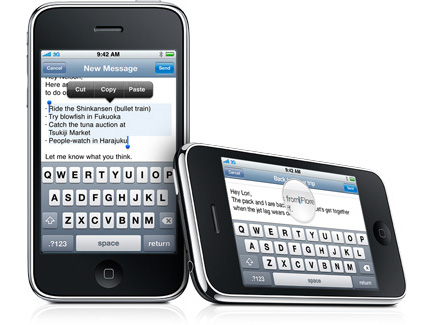Apple gets defensive over dictionary rejection

Apple's senior VP Phil Schiller has responded to the website that highlighted its recent decision to censor a dictionary application, defending his company's actions.
Schiller maintains that as the Ninjawords dictionary application is based on the online dictionary Wiktionary, it contained words and phrases more objectionable than those found in more mainstream efforts.
He told Daring Fireball: "Apple did not censor the content in this developer's application and Apple did not reject this developer's application for including references to common swear words. You accused Apple of both in your story and the fact is that we did neither."
Wait for the parents
He says Apple believed it best Matchstick software, the developer behind Ninjawords, waited until the iPhone 3.0 firmware was available, where parental controls and age ratings were possible.
The problem appears to be that an App Store reviewer told Matchstick that the dictionary contained swearwords, and would need to have an adult age rating even if those words pointed out (like f*ck and sh*t) were removed.
Schiller says this is not the case: "The issue that the App Store reviewers did find with the Ninjawords application is that it provided access to other more vulgar terms than those found in traditional and common dictionaries, words that many reasonable people might find upsetting or objectionable.
Sign up for breaking news, reviews, opinion, top tech deals, and more.
"You are correct that the Ninjawords application should not have needed to be censored while also receiving a 17+ rating, but that was a result of the developers' actions, not Apple's.
"Apple did not ask the developer to censor any content in Ninjawords, the developer decided to do that themselves in order to get to market faster. Even though the developer chose to censor some terms, there still remained enough vulgar terms that it required a parental control rating of 17+."
Not specific
But Matchstick has responded by saying the reviewer wasn't specific enough in their reasons for rejecting the application, and that by waiting for the firmware (when the App was submitted in May, there was no word when the parental controls would debut) they would have suffered a loss in revenue.
Phil Crosby of Matchstick said: "17+ ratings were not available when we launched, which means at that time, it was simply not possible for our dictionary to be on the App Store without being censored. Given the options of censoring or sitting on the side lines while our competitors ate our lunch, we chose to launch."
Either way, it highlights problems in Apple's submission process. While it's understandable to filter content that might offend, the company should have taken into account that finding the words in a dictionary requires a definite user input.
If the company thinks this should be censored, then surely it shouldn't allow minors to access internet sites via the iPhone's web browser, which can lead them easily to Wiktionary, the source of the conflict?
You can read Schiller's email response the problem in full over on Daring Fireball.

Gareth has been part of the consumer technology world in a career spanning three decades. He started life as a staff writer on the fledgling TechRadar, and has grew with the site (primarily as phones, tablets and wearables editor) until becoming Global Editor in Chief in 2018. Gareth has written over 4,000 articles for TechRadar, has contributed expert insight to a number of other publications, chaired panels on zeitgeist technologies, presented at the Gadget Show Live as well as representing the brand on TV and radio for multiple channels including Sky, BBC, ITV and Al-Jazeera. Passionate about fitness, he can bore anyone rigid about stress management, sleep tracking, heart rate variance as well as bemoaning something about the latest iPhone, Galaxy or OLED TV.